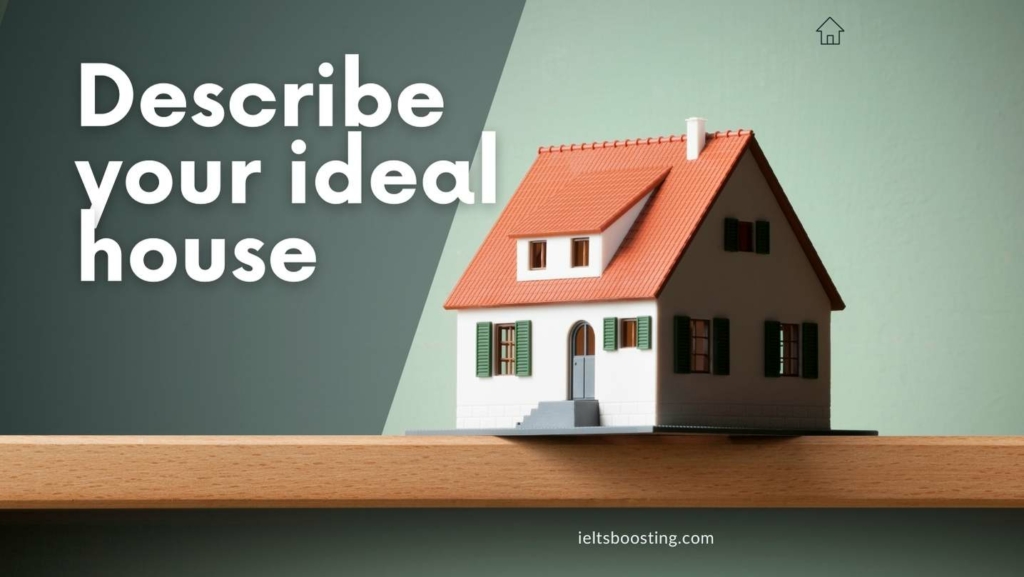Describe your ideal house
You should say:
Where it would be
What it is like
What special features it has
And explain why it would be your ideal house
Sample answer to describe your ideal house
In an ideal world, my dream house would be nestled near a tranquil lake, surrounded by an abundance of trees, offering a serene and picturesque retreat. This setting would provide ample opportunities for fishing and outdoor exercise in the midst of nature.
The house itself would be a two-story structure, designed with a focus on comfort and convenience. Modern technology would be seamlessly integrated to enhance daily life, offering amenities needed for a comfortable and convenient lifestyle, ranging from a well-equipped kitchen to efficient cooling systems.
One of the most striking features of my dream house would be its large, floor-to-ceiling glass windows. These windows would serve two purposes. Firstly, they would offer breathtaking views of the lake and the surrounding trees, allowing me to feel truly immersed in nature while in the comfort of my home. Secondly, they would flood the living spaces with an abundance of natural light, creating a warm and inviting atmosphere.
While the house would be spacious, I would prefer it not to be overly wide to minimize the time required for cleaning and maintenance.
Now, let me explain why this would be my ideal house. Firstly, the proximity to the lake and the small forest would provide a deep sense of connection to nature. I could spend my leisure hours fishing by the lake and hiking through the woods, activities that are essential for my well-being and offer the perfect escape from the hustle and bustle of urban life.
Moreover, the house’s design, with its modern conveniences and large glass windows, would allow me to live in harmony with the environment while enjoying the comforts of contemporary living. It strikes a balance between the serenity of the natural world and the convenience of modern technology.
Explore more: ielts speaking part 2
Part 3-describe an ideal house
What are the most common architectural styles in Vietnamese cities?
In Vietnamese cities, you’ll find a fascinating blend of architectural styles, with French colonial buildings standing out thanks to their distinctive charm and history. Then there’s the modernist architecture, which really took off after the mid-20th century, showcasing more functional designs with a tropical twist. Alongside these, traditional Vietnamese designs are also making a comeback, as people are looking to preserve and incorporate heritage into the urban landscape.
Advanced Vocabulary:
- Fascinating blend: An interesting mix of different styles.
- Heritage: Valued objects and qualities such as historic buildings and cultural traditions that have been passed down from previous generations.
Phrase Verb:
- Took off: Became popular or successful.
What’s the difference between an apartment and a house?
An apartment is typically part of a larger residential building and offers less privacy than a house, which stands alone and usually has more space. In an apartment, you’ve got shared amenities like gyms or pools, but a house often comes with its own yard and garage. Also, houses generally offer more freedom for personalization and modifications, while apartments might have restrictions due to building regulations.
Advanced Vocabulary:
- Amenities: Desirable or useful features or facilities of a building or place.
- Personalization: The action of designing or producing something to meet someone’s individual requirements.
Phrase Verb:
- Comes with: Includes as an additional part, feature, or benefit.
What’s the difference between living in the countryside and living in the city?
Living in the countryside usually means more peace and quiet, as you’re surrounded by nature and there’s less hustle and bustle compared to the city. In the city, though, you’ve got the convenience of being close to work, shops, and entertainment – everything’s just a stone’s throw away. But the trade-off is that you might miss out on the spacious living and the close-knit community atmosphere you often find in rural areas.
Advanced Vocabulary:
- Hustle and bustle: Busy and noisy activity.
- Close-knit community: A group of people in an area who know each other well and provide a sense of belonging.
Phrase Verb:
- Miss out on: Fail to experience or take advantage of something.
What are the advantages of the facilities of the apartment and the facilities of the house?
Apartment living often comes with perks like maintenance staff on hand, which means you don’t have to sweat the small stuff like fixing a leaky tap. Plus, apartments can have shared facilities like a pool or a gym, which are great for socializing and staying fit without leaving home. Houses, on the other hand, often boast private gardens and more personal space, giving you the freedom to entertain guests or just spread out and relax.
Advanced Vocabulary:
- Perks: Benefits or advantages.
- Boast: Possess a feature that is a source of pride.
Phrase Verb:
- Spread out: Extend over a larger area or create more space around oneself.
What difficulties do people have living in the city?
Living in the city can sometimes be a bit overwhelming because of the constant noise and the fast pace of life. Another big challenge is the cost of living – things like rent and everyday expenses can be really high. And let’s not forget about the traffic; getting around can be a headache, especially during rush hours when the streets are jam-packed.
Advanced Vocabulary:
- Overwhelming: Very intense or difficult to deal with.
- Jam-packed: Extremely crowded or full to capacity.
Phrase Verb:
- Getting around: Moving or traveling from place to place within an area.
What can be done to reduce the stress of city life?
To reduce the stress of city life, creating more green spaces like parks and gardens can be a real game-changer/major benefit, as they offer a peaceful escape from the urban hustle. Improving public transport can also make a big difference, easing the strain of daily commutes and reducing traffic congestion. Additionally, promoting community events and activities can foster a sense of belonging and help alleviate the feeling of being lost in the crowd.
Advanced Vocabulary:
- Green spaces: Areas of grass, trees, or other vegetation set apart for recreational or aesthetic purposes in an otherwise urban environment.
- Traffic congestion: Overcrowding of roadways by vehicles, leading to slower speeds, longer trip times, and increased vehicular queuing.
Phrase Verb:
- Foster a sense of belonging: To encourage the development of a feeling of being part of a community or group.



